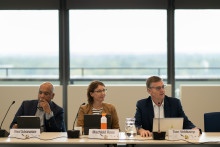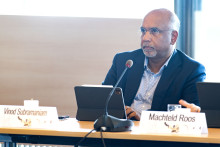Margo Dietrich of student party UReka brought up the concerns this morning at the meeting between University Council and Executive Board. ‘I recently went to a convention of the educational officers of study associations. They were discussing the issue that not all teachers were recording their lectures. With attendance for some physical lectures being mandatory, this creates issues for students who can’t be there because of covid-19 symptoms. Why aren’t alternatives being provided?’
Mixed signals
Rector Thom Palstra shared the concerns, but also mentioned that the current situation isn’t completely abnormal. ‘Previously, when students got ill – sometimes even for a long time – they also couldn’t attend lectures and programmes found ways to still make things work. We’re encouraging video recording and we’re in the process of expanding our recording equipment capacity, but we don’t have the proper facilities yet. With the high demand, delivery is also an issue.’
Still, the University Council thinks the university is sending mixed signals to its students. Chairman Herbert Wormeester: ‘Students with mild symptoms are put in a dilemma: they have to choose between going to mandatory lectures or staying at home, like we ask them to. The moment we as a university tell them to stay at home, we have to provide a reasonable alternative.’
Alina Ritter from the UReka party added that those reasonable alternatives are not that hard to find. Basically, anything goes. ‘I had lectures where teachers simply put up their laptops and started Canvas Conference. Students at home can follow the lectures, see which slides are being shown and pose questions in the chat. It’s easy to implement.’
Up to the programmes
The main question from the council to the board: shouldn’t there be a central policy in place, maybe even forcing teachers to record all physical lectures. That’s a bridge too far, according to the Executive Board. In fact, the council seemed to be barking up the wrong tree this morning. ‘Why are we discussing this matter here?,’ asked Palstra. ‘This should be discussed in the programme committees. We have a broad guideline in place, offering at least one resit for every exam. But the implementation of specific policies is on the authority of programmes and faculties, by law.’
Vice-president Mirjam Bult concluded that there is no generic solution and the Executive Board won’t set up a central policy. So for the foreseeable future, it’s up to the programmes to draw a line and provide alternatives. ‘Fortunately, many teachers come up with innovative solutions. We think it’s important these are shared among peers, so we absolutely stimulate the programmes to look for peer-to-peer solutions.’







